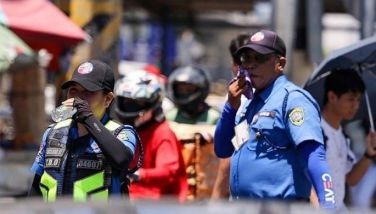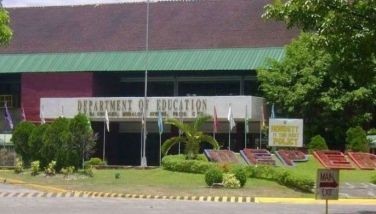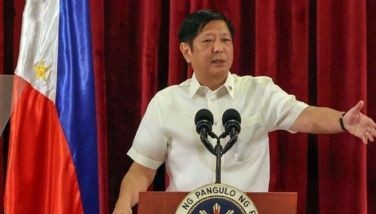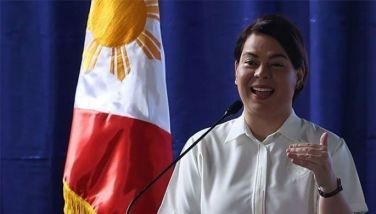Congress eyes probe on spate of drug killings
BAGUIO CITY, Philippines – Ifugao Rep. Teodoro Baguilat Jr. called yesterday for a congressional investigation into the spate of killings by police of suspected drug criminals.
In a resolution filed in the House of Representatives, Baguilat said “the Constitution mandates that no one should be deprived of life without due process of law, and that all accused are presumed innocent.”
Sen. Leila de Lima has also called for an inquiry into the spate of killings of suspected drug pushers by policemen.
De Lima said that she has prepared a resolution for the Senate investigation, which she will file in the coming days.
Baguilat, a member of the Liberal Party, expressed alarm over “the spate of extrajudicial killings of suspected drug criminals by people we expect to uphold the law.”
He said this indicated a disrespect for the Constitution and the deterioration of the rule of law. “And if we don’t stop it or look into its causes, soon enough, people will take the law into their own hands, leading to anarchy and the disintegration of society.”
He noted that since the inauguration last June 30 of President Duterte, at least 23 suspected drug criminals have been killed by policemen under vague circumstances. ?While the Philippine National Police recorded the killing of 68 suspected drug criminals from Jan. 1 to June 15, 25 or almost half that number were killed in a mere five days from June 16 to 20.
“(This is a) “shocking increase in police-perpetrated killings,” according to Baguilat.?Baguilat said that no less than the Office of the President, through presidential spokesman Ernesto Abella, expressed alarm, while cause-oriented groups like the National Union of People’s Lawyers called for a stop to the killings.?“There is clearly a clamor from the public and government officials to at least look into these killings or executions, and it falls upon Congress, as an instrument of the rule of law, to scrutinize the circumstances behind these killings,” Baguilat said.?He did not discount the possibility that the killings might be due to lack of equipment or training on the part of the policemen concerned. ?“This only adds justification to the investigation I am calling for. If our police need more support to effectively fight the drug war, then proper legislation can guarantee they get the support they need,” the lawmaker said.?“All good Filipinos abhor illegal drugs. But the war on drugs cannot be fought at the cost of innocent lives, the very people that the war is trying to protect. For the sake of innocent and law-abiding Filipinos, we must ensure that the law, the Constitution, is upheld even in the face of a desperate war against drugs,” he said.
According to De Lima, there were “telltale signs of summary executions” in some of the incidents and as the numbers continue to go up, she said that there is a need to look into it more closely.
She conceded that some of these killings were legitimate and that the suspects actually engaged the authorities or attempted to grab the guns of the police while in custody.
“But this cannot be the case for all of them. Because we keep on hearing the reports saying that they tried to grab the guns. So there are telltale signs of summary killing in some of them, in many of them,” De Lima said.
She said there were discrepancies in figures.
“Some newspapers are citing figures, but what is the correct figure? But one thing is sure, almost every day there are killings and many of them are an offshoot of police operations, so we have to look into the legitimacy of the manner, of the method by which these police enforcers are doing their job,” she said.
“So definitely that would be in aid of legislation.”
She said that there should be a review of the operational procedures of law enforcement agencies such as the Philippine National Police and standards could be set through legislation.
De Lima aired her concern that these incidents are not being investigated properly immediately after they take place.
“There’s an internal affairs unit but I don’t know how active or proactive our internal unit or PNP internal affairs office is,” she said.
However, Sen. Panfilo Lacson, who is expected to be chairman of the Senate committee on public order and dangerous drugs where the resolution of De Lima will most likely be referred to, said that he was not keen on conducting an inquiry based on suspicions of his colleague alone.
Lacson, a former PNP chief, said that he would always give the policemen “the benefit of the doubt that they are just performing their duties” when it comes to such operations.
“For me there is always a presumption of regularity in the performance. The police know what they are doing and they know what would get them in trouble, so we should let them do their jobs,” Lacson said.
“If someone will file a complaint, why not? But if there are no complaints and you are just speculating that there were executions, what basis do you have for filing a resolution?” Lacson said.
Meanwhile, lawyer Edre Olalia, secretary general of the National Union of Peoples Lawyers (NUPL), said though the drug menace must stop, the apparent serial summary executions of alleged drug users “must also stop.”
Olalia acknowledged that “it may be long, hard, challenging and frustrating but you can stop one without automatically or instantly doing the other as a practice or policy.
“The madness must stop, quick fix savagery and abuse of power by law enforcers supposedly to quell criminality and drugs, which, wittingly or unwittingly, directly or indirectly, are encouraged, condoned or sanctioned, is a Frankenstein that will haunt us all over time,” Olalia added.
Police generals
De Lima also expressed concern over the move of President Duterte to name five police generals suspected of being involved in the illegal drug trade, which she said violated their right to due process.
Interviewed at the Senate yesterday, De Lima said that what the President did was not entirely wrong because it could also have some positive impact.
“I think the name and shame tack adopted by our President has both a plus and a minus. On one hand, it demonstrates his seriousness and determination to really stamp out criminality and corruption, especially official corruption within the PNP ranks, between and among the PNP officials. So that’s the plus,” De Lima said.
“On the other hand, there is a violation of due process. There’s still presumption of innocence and therefore, they are entitled to be heard. They should not be put and subjected to trial by publicity,” she added.
Duterte said the five police generals were former PNP deputy director general Marcelo Garbo, Directors Joel Pagdilao, Chief Supts. Bernardo Diaz and Edgardo Tinio and retired general Vicente Loot.
Loot arrived at the Ninoy Aquino International Airport (NAIA) Terminal 3 from Cebu around 3:40 p.m. yesterday.
Loot is expected to meet PNP chief Director General Ronald de la Rosa and officials of the National Police Commission (Napolcom) to clear his name.
A former chairperson of the Commission on Human Rights and justice secretary, De Lima said that the five police generals were being subjected to trial by publicity when the President announced their names in public.
Even before they are investigated and given the chance to prove their innocence, De Lima said that “everybody’s talking about them already and then their families are affected too.”
“What if one or two of them happened to be innocent, wrongfully suspected of the things they are suspected by the President? There has to be a fair and credible investigation. We should avoid trial by publicity,” she said.
De Lima also aired her reservations about the Napolcom being tasked by the President to conduct the investigation on the five generals.
She said that there is pressure on Napolcom to support the claims of the President that they were involved in the illegal drug trade even before they are investigated.
On the other hand, Sen. Richard Gordon saw nothing wrong with what the President did because the five generals would still have their chance to defend themselves in a legal process.
“Well, they’re going to get their day in court. What is violated when they are not judged. They were just accused of violating the Dangerous Drugs Law that they are coddling and they are high officials in charge of the drug problem and law and order, and they are not doing their job. Any citizen can say that, especially the President,” Gordon said.
As long as they are subjected to an investigation and not relieved without due process, then Gordon said that what the President did was aboveboard.
Ombudsman probe
The Office of the Ombudsman might take over the investigation against the five PNP generals if the Napolcom refers the case to the anti-graft agency.
STAR sources said Ombudsman Conchita Carpio-Morales might also handle the criminal aspect of the case by launching a motu propio probe or if a complaint is filed against the respondents showing that the alleged crime committed is in relation to their office.
Based on a memorandum of agreement (MOA) entered into by the Office of the Ombudsman, the Napolcom and the PNP in September 2012, all three agencies recognize that they have concurrent disciplinary authority over police officials and personnel.
But since the anti-graft agency is mandated by law to give priority to complaints filed against high-ranking government officials and/or those occupying supervisory positions, complaints involving grave offenses, and well as complaints involving large sums of money and or properties, it should handle cases involving high-ranking officers of the police force.
“The Napolcom or chief PNP may, at their discretion, refer to the ombudsman the adjudication of highly sensationalized administrative cases committed by PNP officers and members,” part of the MOA reads.
Low priority cases, on the other hand, may be referred to Napolcom, which also has primary jurisdiction over grave administrative cases under its Uniform Rules of Procedure before the Administrative Disciplinary Authorities and Internal Affairs Service.
Privacy commissioner Raymund Liboro of the National Privacy Commission (NPC) said the five police generals could not seek refuge from Republic Act 10173 or the Data Privacy Law. – With Jess Diaz, Marvin Sy, Rainier Allan Ronda, Michael Punongbayan, Rudy Santos
- Latest
- Trending
































